| Listing 1 - 10 of 168 | << page >> |
Sort by
|
Book
ISBN: 3922498469 9783922498469 Volume: 41 Publisher: Freiburg in Brisgau : Max-Planck-Institut.
Abstract | Keywords | Export | Availability | Bookmark
 Loading...
Loading...Choose an application
- Reference Manager
- EndNote
- RefWorks (Direct export to RefWorks)
Narcotics, Control of --- Congresses --- Drug control --- 343.966 --- 343.966 Drugs --- Drugs --- Drug enforcement --- Drug law enforcement --- Drug policy --- Drug traffic --- Drug traffic control --- War on drugs --- Vice control --- Government policy --- Congresses. --- Drug control - Europe - Congresses.
Periodical
ISSN: 16833252 08735379 Year: 1996 Publisher: Lisbon : European Monitoring Centre for Drugs and Drug Addiction,
Abstract | Keywords | Export | Availability | Bookmark
 Loading...
Loading...Choose an application
- Reference Manager
- EndNote
- RefWorks (Direct export to RefWorks)
Drug control --- Drug enforcement --- Drug law enforcement --- Drug policy --- Drug traffic --- Drug traffic control --- Drugs --- Narcotics, Control of --- War on drugs --- Government policy --- Vice control --- Drug control. --- Europe --- EU countries --- Euroland --- Prevention --- European Union countries.
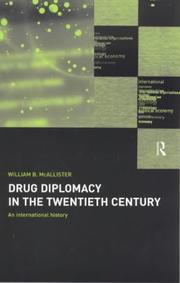
ISBN: 0415179904 0415179890 Year: 2000 Publisher: New York London Routledge
Abstract | Keywords | Export | Availability | Bookmark
 Loading...
Loading...Choose an application
- Reference Manager
- EndNote
- RefWorks (Direct export to RefWorks)
Drug abuse --- Drug control --- Prevention --- History --- International cooperation --- Drug enforcement --- Drug law enforcement --- Drug policy --- Drug traffic --- Drug traffic control --- Drugs --- Narcotics, Control of --- War on drugs --- Vice control --- Drug use --- Recreational drug use --- Substance abuse --- Government policy --- 20th century
Book
ISBN: 1108567088 1108475450 1108680178 1108622380 Year: 2019 Publisher: Cambridge : Cambridge University Press,
Abstract | Keywords | Export | Availability | Bookmark
 Loading...
Loading...Choose an application
- Reference Manager
- EndNote
- RefWorks (Direct export to RefWorks)
Iran has one of the world's highest rates of drug addiction: estimated to be between 2 and 7 percent of the entire population. This makes the questions that this book asks all the more salient: what is the place of illegal substances in the politics of modern Iran? How have drugs affected the formation of the Iranian state and its power dynamics? And how have governmental attempts at controlling and regulating illicit drugs affected drug consumption and addiction? By answering these questions, Maziyar Ghiabi suggests that the Islamic Republic of Iran's image as an inherently conservative state is not only misplaced and inaccurate, but in part a myth. In order to dispel this myth, he skilfully combines ethnographic narratives from drug users, vivid field observations from 'under the bridge', with archival material from the pre- and post-revolutionary era, statistics on drug arrests and interviews with public officials. This title is also available as Open Access on Cambridge Core.
Drug control --- Drug abuse --- Government policy --- Drug use --- Recreational drug use --- Substance abuse --- Drug enforcement --- Drug law enforcement --- Drug policy --- Drug traffic --- Drug traffic control --- Drugs --- Narcotics, Control of --- War on drugs --- Vice control --- drugs; Iran; politics
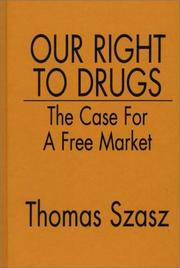
ISBN: 0275942163 Year: 1992 Publisher: New York Praeger
Abstract | Keywords | Export | Availability | Bookmark
 Loading...
Loading...Choose an application
- Reference Manager
- EndNote
- RefWorks (Direct export to RefWorks)
Drug control --- Drug legalization --- Pharmaceutical policy --- Moral and ethical aspects. --- Drug enforcement --- Drug law enforcement --- Drug policy --- Drug traffic --- Drug traffic control --- Drugs --- Narcotics, Control of --- War on drugs --- Moral and ethical aspects --- Government policy --- Vice control
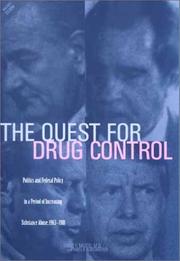
ISBN: 1281735272 9786611735272 9780300137842 0300137842 9781281735270 9780300090369 0300090366 6611735275 Year: 2002 Publisher: New Haven Yale University Press
Abstract | Keywords | Export | Availability | Bookmark
 Loading...
Loading...Choose an application
- Reference Manager
- EndNote
- RefWorks (Direct export to RefWorks)
Between 1960 and 1980 various administrations attempted to deal with a rising tide of illicit drug use that was unprecedented in U.S. history. This valuable book provides a close look at the politics and bureaucracy of drug control policy during those years, showing how they changed during the presidencies of Johnson, Nixon, Ford, and Carter and how much current federal drug-control policies owe to those earlier efforts. David F. Musto, M.D., and Pamela Korsmeyer base their analysis on a unique collection of 5,000 pages of White House documents from the period, all of which are included on a searchable CD-ROM that accompanies the book. These documents reveal the intense debates that took place over drug policy. They show, for example, that staffers and cabinet officers who were charged with narcotics policy were often influenced by the cultural currents of their times, and when the public reacted in an extreme fashion to rising drug use, officials were disinclined to adopt modified policies that might have been more realistic. Musto and Korsmeyer's investigation into the decision-making processes that shaped past drug control efforts in the United States provides essential background as creative approaches to the drug problem are sought for the future.
Drug control --- Drug abuse --- Drug use --- Substance abuse --- Drug enforcement --- Drug law enforcement --- Drug policy --- Drug traffic --- Drug traffic control --- Drugs --- Narcotics, Control of --- War on drugs --- Vice control --- History --- Government policy
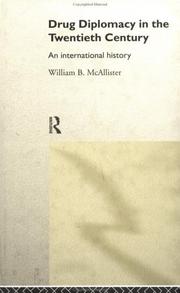
ISBN: 0203009797 1282777335 9786612777332 1134680651 9780203009796 9780415179898 0415179890 9780415179904 0415179904 9781134680658 0415179890 0415179904 9781282777330 6612777338 9781134680603 9781134680641 1134680643 Year: 2000 Publisher: London ANew York Routledge
Abstract | Keywords | Export | Availability | Bookmark
 Loading...
Loading...Choose an application
- Reference Manager
- EndNote
- RefWorks (Direct export to RefWorks)
Drug Diplomacy is the first comprehensive historical account of the evolution of the global drugs control regime. The book analyzes how the rules and regulations that encompass the drug question came to be framed. By examining the international historical aspects of the issue, the author addresses the many questions surrounding this global problem. Including coverage of substances from heroin and cocaine to morphine, stimulants, hallucinogens and alcohol, Drug Diplomacy addresses: * the historical development of drug laws, drug-control institutions, and attitudes abou
Drug control --- Drug abuse --- Drug use --- Substance abuse --- Drug enforcement --- Drug law enforcement --- Drug policy --- Drug traffic --- Drug traffic control --- Drugs --- Narcotics, Control of --- War on drugs --- Vice control --- History --- International cooperation --- Prevention --- Government policy
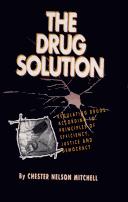
ISBN: 0773595821 9780773595828 9780886291167 Year: 1990 Publisher: Ottawa [Ontario] Beaconsfield, Quebec
Abstract | Keywords | Export | Availability | Bookmark
 Loading...
Loading...Choose an application
- Reference Manager
- EndNote
- RefWorks (Direct export to RefWorks)
This provocative volume makes a valuable contribution to debates on drug legislation. It is the only book that analyses and assesses all regulatory alternatives to drug prohibition. The author brings together research from the scientific, medical, ethical and legal fields to criticize drug laws and enforcement policies of many countries, including the U.S. and Canada.
Drug control. --- Narcotic laws. --- Decriminalization. --- Criminal law --- Punishment --- Narcotics --- Drugs --- Pharmacy --- Drug control --- Drug enforcement --- Drug law enforcement --- Drug policy --- Drug traffic --- Drug traffic control --- Narcotics, Control of --- War on drugs --- Vice control --- Law and legislation --- Government policy
Book
ISBN: 0585478783 9780585478784 Year: 2003 Publisher: [Place of publication not identified] International Debate Education Association
Abstract | Keywords | Export | Availability | Bookmark
 Loading...
Loading...Choose an application
- Reference Manager
- EndNote
- RefWorks (Direct export to RefWorks)
Drug abuse --- Drug control --- Social Welfare & Social Work --- Social Sciences --- Substance Abuse --- Drug enforcement --- Drug law enforcement --- Drug policy --- Drug traffic --- Drug traffic control --- Drugs --- Narcotics, Control of --- War on drugs --- Vice control --- Prevention of drug abuse --- Prevention --- Government policy
Book
ISBN: 1613765517 9781613765517 9781625343161 1625343167 9781625343154 1625343159 Year: 2017 Publisher: Boston : Baltimore, Md. : UMass Press, Project MUSE,
Abstract | Keywords | Export | Availability | Bookmark
 Loading...
Loading...Choose an application
- Reference Manager
- EndNote
- RefWorks (Direct export to RefWorks)
The story of America's "War on Drugs" usually begins with Richard Nixon or Ronald Reagan. In Containing Addiction, Matthew R. Pembleton argues that its origins instead lie in the years following World War II, when the Federal Bureau of Narcotics - the country's first drug control agency, established in 1930 - began to depict drug control as a paramilitary conflict and sent agents abroad to disrupt the flow of drugs to American shores. U.S. policymakers had long viewed addiction and organized crime as profound domestic and transnational threats. Yet World War II presented new opportunities to implement drug control on a global scale. Skeptical of public health efforts to address demand, the Federal Bureau of Narcotics believed that reducing the global supply of drugs was the only way to contain the spread of addiction. In effect, America applied a foreign policy solution to a domestic social crisis, demonstrating how consistently policymakers have assumed that security at home can only be achieved through hegemony abroad. The result is a drug war that persists into the present day.
Drug control --- Drug enforcement --- Drug law enforcement --- Drug policy --- Drug traffic --- Drug traffic control --- Drugs --- Narcotics, Control of --- War on drugs --- Vice control --- History --- Government policy --- United States. --- FBN --- History.
| Listing 1 - 10 of 168 | << page >> |
Sort by
|

 Search
Search Feedback
Feedback About
About Help
Help News
News